Todos los padres primerizos se ponen nerviosos ante la llegada de su primer hijo y todo lo que la recién estrenada paternidad conlleva, pero, si a esto le añadimos la presencia de una mascota en el hogar, los nervios y la preocupación se multiplican todavía más.
Los futuros papas se plantean muchas preguntas sobre la futura interacción entre el perro y el bebé. Por eso, hoy desde Clínica Veterinaria Galileo os recomendamos una serie de medidas y consejos a los nuevos y futuros papas, para que la convivencia y relaciones, entre vuestras mascotas y el nuevo miembro de la familia sean lo más cómodas y felices posible.
- Los mayoría de las mascotas sienten curiosidad y no suelen presentar signos de agresividad hacia los bebes.
- Muchos perros pueden percibir al bebé como un mamífero extraño y una posible pieza de caza y, por lo tanto, no lo reconocerán como una cría de seres humanos. Por ello, es importante hablar con vuestros veterinarios para tomar precauciones, evitando así desagradables incidentes.
- Es importante que los futuros papas se aseguren que su mascota nunca ha tenido comportamientos agresivos hacia niños, otros bebes, e incluso, adultos. Por comportamiento agresivo entendemos un comportamiento predatorio, de caza, hacia otros perros, gatos, pájaros o cualquier otro mamífero.
- Si vuestra mascota ha mostrado en algún momento algún tipo de agresión, los futuros padres deberán consultar con su veterinario para que éste evalúe al animal y les recomiende a un buen terapeuta para que éste marque un plan de trabajo, y reducir la probabilidad de que vuestro perro pueda ser agresivo con el bebé.
Además de estos consejos para prevenir posibles incidentes, también los futuros papas deberán tener en cuenta los sentimientos de su mascota.
Los perros, por ejemplo, pueden cambiar sus conductas con la llegada del nuevo bebé, al sentir que reciben menos atención que antes. La mascota puede recurrir a ciertas actividades para llamar la atención y de paso, para aliviar su reciente estrenado aburrimiento.
Los nuevos padres deben hacer participe a su mascota de la nueva situación familiar, para que el perro sienta al bebé como un miembro más de la familia. Es importante que no se regañe o se aísle a la mascota, ya que, ésta puede realizar una mala asociación respecto al niño y el nuevo trato que está recibiendo.
Es importante que recordéis que un bebé o un niño muy pequeño no deben quedarse solos con un animal en ningún caso. Esto no quiere decir que sea porque el perro pueda ser agresivo con él, sino porque los niños pueden tener reacciones extrañas hacia el animal cuando éste, por ejemplo, se acerque para jugar o buscar contacto físico o simplemente para mostrarle su cariño por ellos.
De acuerdo con todo esto, una buenas instrucciones para los nuevos papas podrían ser:
- No regañar al perro cuando éste se muestre curioso alrededor del bebé.
- Dejar que el perro huela y vea al bebé, siempre atentamente vigilado y con cuidado.
- Realizar asociaciones agradables para nuestra mascota relacionadas con el bebé.
- Dedicarle el mayor tiempo posible a nuestra mascota, para que ésta no se sienta desplazada o abandonada frente al nuevo miembro de la familia.
- No dejar nunca solos al bebé y al perro u otra mascota.
- No aislar totalmente al perro del bebé.
En el post de mañana os hablaremos sobre la introducción del bebé en el hogar antes de su nacimiento.
All new parents are nervous before the arrival of their first child and everything the brand new fatherhood entails, but if we add the presence of a pet at home, nerves and worries multiply further.
Potato futures raised many questions about the future interaction between the dog and the baby. So today since Galileo Veterinary Clinic we recommend a series of measures and advice to new and future popes, for coexistence and relationships between pets and your new family member as comfortable and happy as possible.
The Most pets are curious and often do not show signs of aggression towards infants.
Many dogs can perceive the baby as a mammal strange and a possible piece of hunting and, therefore, can not be recognized as a human breeding. Therefore, it is important to talk to your veterinarian to take precautions, avoiding unpleasant incidents.
It is important that future popes to ensure that your pet has never had aggressive behavior towards children, other babies, and even adults. For understand aggressive behavior predatory behavior, hunting, toward other dogs, cats, birds or any other mammal.
If your pet has shown at some point some kind of aggression, prospective parents should consult their veterinarian to evaluate the animal and it will recommend a good therapist for it check a work plan, and reduce the likelihood that your dog can be aggressive with the baby.
In addition to these tips to prevent possible incidents, also future popes must take into account the feelings of your pet.
Dogs, for example, can change their behavior with the arrival of new baby, feeling that receive less attention than before. The pet may resort to certain activities to draw attention and incidentally, to relieve their boredom recently released.
New parents should make your pet part of the new family situation, so that the dog feels the baby as a family member. It is important not to scold or isolate the pet, since, it can make a bad association to the child and the new deal you are getting.
It is important to remember that an infant or very young child should not be left alone with an animal in any case. This does not mean it's because the dog can be aggressive with him, but because children may have unusual reactions to the animal when he, for example, is closer to play or seek physical contact or simply to show your affection for them.
According to all this, a good instructions for new potatoes could be:
- Do not scold the dog when it is displayed around the baby curious.
- Let the dog smell and see the baby, always closely monitored and carefully.
- Making our pet-friendly associations related to the baby.
- Dedicate 10 minutes a day the dog so it does not feel displaced or abandoned.
- Never leave the baby alone and the dog or other pet.
- Not completely isolate the baby dog.
In tomorrow's post I'll talk about the introduction of the baby at home before his birth.

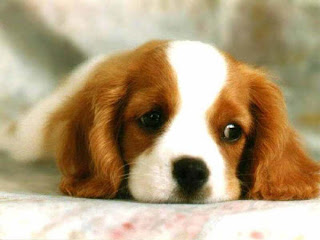

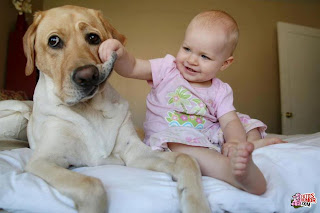

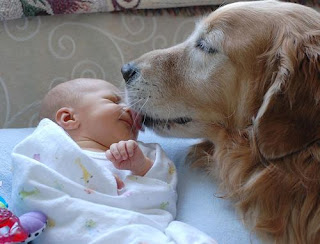

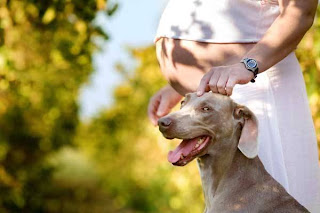

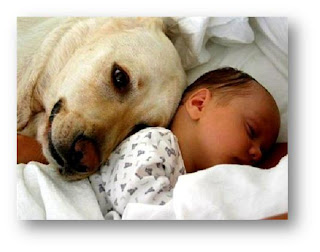
No hay comentarios:
Publicar un comentario